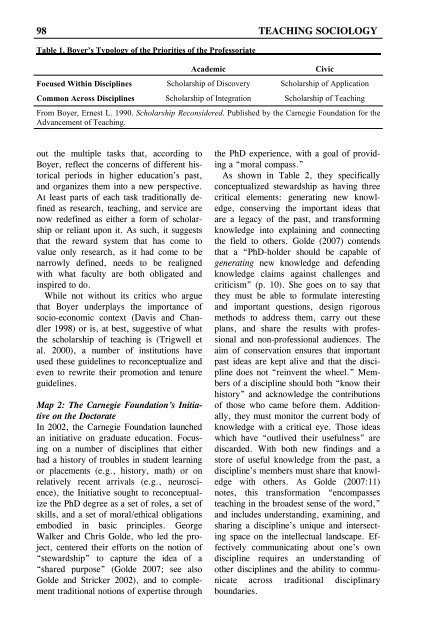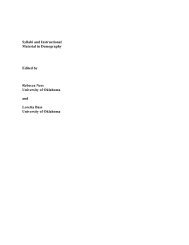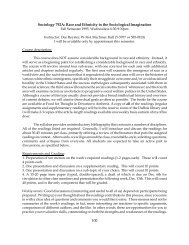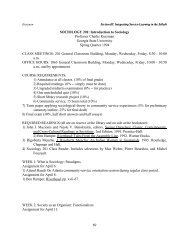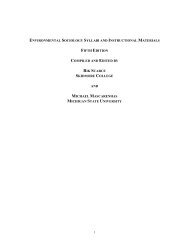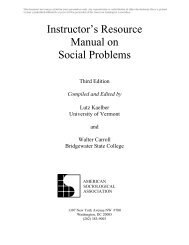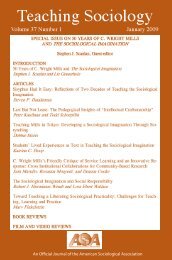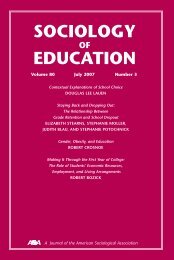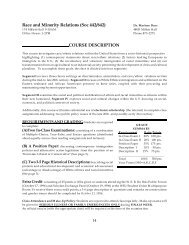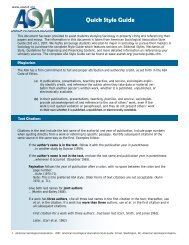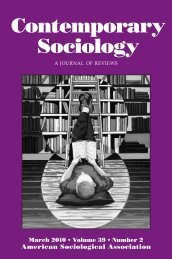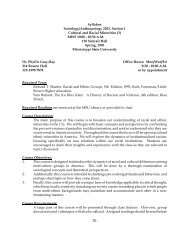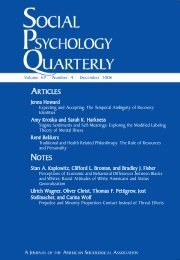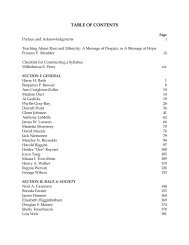3337 TS Vol36_2_APRIL 08 - American Sociological Association
3337 TS Vol36_2_APRIL 08 - American Sociological Association
3337 TS Vol36_2_APRIL 08 - American Sociological Association
Create successful ePaper yourself
Turn your PDF publications into a flip-book with our unique Google optimized e-Paper software.
98 TEACHING SOCIOLOGY<br />
Table 1. Boyer’s Typology of the Priorities of the Professoriate<br />
Academic Civic<br />
Focused Within Disciplines Scholarship of Discovery Scholarship of Application<br />
Common Across Disciplines Scholarship of Integration Scholarship of Teaching<br />
From Boyer, Ernest L. 1990. Scholarship Reconsidered. Published by the Carnegie Foundation for the<br />
Advancement of Teaching.<br />
out the multiple tasks that, according to<br />
Boyer, reflect the concerns of different historical<br />
periods in higher education’s past,<br />
and organizes them into a new perspective.<br />
At least parts of each task traditionally defined<br />
as research, teaching, and service are<br />
now redefined as either a form of scholarship<br />
or reliant upon it. As such, it suggests<br />
that the reward system that has come to<br />
value only research, as it had come to be<br />
narrowly defined, needs to be realigned<br />
with what faculty are both obligated and<br />
inspired to do.<br />
While not without its critics who argue<br />
that Boyer underplays the importance of<br />
socio-economic context (Davis and Chandler<br />
1998) or is, at best, suggestive of what<br />
the scholarship of teaching is (Trigwell et<br />
al. 2000), a number of institutions have<br />
used these guidelines to reconceptualize and<br />
even to rewrite their promotion and tenure<br />
guidelines.<br />
Map 2: The Carnegie Foundation’s Initiative<br />
on the Doctorate<br />
In 2002, the Carnegie Foundation launched<br />
an initiative on graduate education. Focusing<br />
on a number of disciplines that either<br />
had a history of troubles in student learning<br />
or placements (e.g., history, math) or on<br />
relatively recent arrivals (e.g., neuroscience),<br />
the Initiative sought to reconceptualize<br />
the PhD degree as a set of roles, a set of<br />
skills, and a set of moral/ethical obligations<br />
embodied in basic principles. George<br />
Walker and Chris Golde, who led the project,<br />
centered their efforts on the notion of<br />
“stewardship” to capture the idea of a<br />
“shared purpose” (Golde 2007; see also<br />
Golde and Stricker 2002), and to complement<br />
traditional notions of expertise through<br />
the PhD experience, with a goal of providing<br />
a “moral compass.”<br />
As shown in Table 2, they specifically<br />
conceptualized stewardship as having three<br />
critical elements: generating new knowledge,<br />
conserving the important ideas that<br />
are a legacy of the past, and transforming<br />
knowledge into explaining and connecting<br />
the field to others. Golde (2007) contends<br />
that a “PhD-holder should be capable of<br />
generating new knowledge and defending<br />
knowledge claims against challenges and<br />
criticism” (p. 10). She goes on to say that<br />
they must be able to formulate interesting<br />
and important questions, design rigorous<br />
methods to address them, carry out these<br />
plans, and share the results with professional<br />
and non-professional audiences. The<br />
aim of conservation ensures that important<br />
past ideas are kept alive and that the discipline<br />
does not “reinvent the wheel.” Members<br />
of a discipline should both “know their<br />
history” and acknowledge the contributions<br />
of those who came before them. Additionally,<br />
they must monitor the current body of<br />
knowledge with a critical eye. Those ideas<br />
which have “outlived their usefulness” are<br />
discarded. With both new findings and a<br />
store of useful knowledge from the past, a<br />
discipline’s members must share that knowledge<br />
with others. As Golde (2007:11)<br />
notes, this transformation “encompasses<br />
teaching in the broadest sense of the word,”<br />
and includes understanding, examining, and<br />
sharing a discipline’s unique and intersecting<br />
space on the intellectual landscape. Effectively<br />
communicating about one’s own<br />
discipline requires an understanding of<br />
other disciplines and the ability to communicate<br />
across traditional disciplinary<br />
boundaries.


